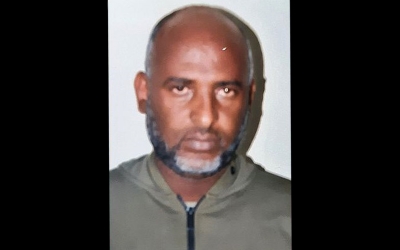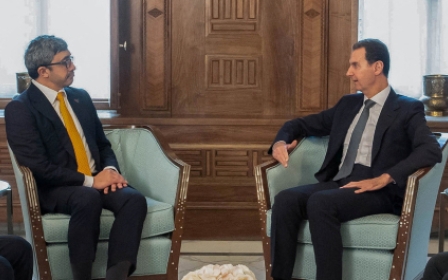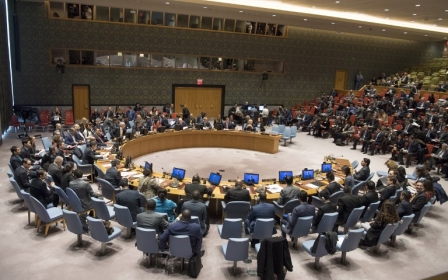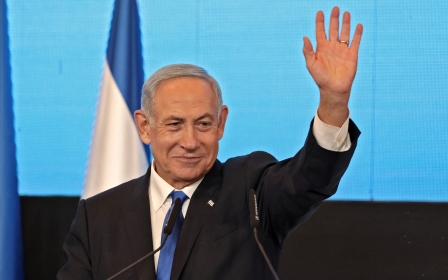UAE-led team arrests 'world's most wanted human trafficker' in Sudan
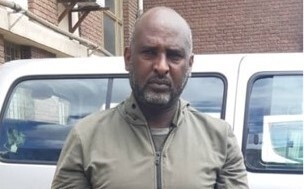
An Eritrean human trafficker who headed a notorious Libya-based human trafficking ring responsible for the murder, torture and extortion of thousands of African migrants, has been arrested in Sudan.
Picked up on New Year’s day in a multinational police operation overseen by the United Arab Emirates, Kidane Zekarias Habtemariam had been on the run since his February 2021 escape from a courthouse in Ethiopia, where he spent a year behind bars.
“Thanks to the professionalism and dedication of our police officers, the world’s most wanted human trafficker will no longer be able to commit his despicable actions,” said Brigadier Saeed Abdullah al-Suwaidi, Director General of the UAE’s Federal Anti-Narcotics Department.
Suwaidi also stated that Kidane’s criminal enterprise had been neutralised. According to a statement sent to Middle East Eye by Interpol, who had issued Kidane a red notice, Emirati police managed to discover his whereabouts by extensively investigating his network’s money laundering operations.
“It is a testament to the Interpol network, and what can be achieved when countries work together,” explained Stephen Kavanagh, Executive Director of Interpol Police Services.
Pursued by authorities on either side of the Mediterranean for years, Kidane took advantage of the lawlessness that wracked Libya after the overthrow of former ruler Muammar Gaddafi in 2011 to establish himself as a kingpin among competing human trafficking bosses in North Africa.
In October 2021, the Netherlands and Europol setup a taskforce to locate the stocky, middle aged Kidane, who has a listed age of 38.
Described by Dutch authorities as being among the “cruellest” of people smugglers, Kidane’s criminal network preyed upon migrants desperate to flee conflict, poverty and oppression for European shores, by luring them from Ethiopia, Eritrea, Sudan and Somalia to his base in the town of Bani Walid, 180km southeast of the Libyan capital Tripoli.
After his arrest, Kidane was extradited to the UAE where the Gulf country will seek to try him on money laundering charges.
"Firstly, we intend to try him in the United Arab Emirates for money laundering. We have ten people detained in the UAE in relation to the case," Major Hamad Khatir, director of the UAE's Ministry of Interior International Operations Department, told MEE at a press conference.
"When the prosecution has completed its work and there is a final judgement, we can proceed with charges elsewhere [outside of the UAE]."
'A savage, a monster'
Survivors have shared chilling testimony with the MEE of starvation, murder and torture at the warehouse, which held hundreds of hostages at a time.
Families of hostages would be coerced into selling their homes and other possessions to cover ransom payments, in the tens of thousands of dollars, to save the lives of their loved ones.
“The man is a savage, a monster,” 25 year old Ethiopian victim Fuad Bedru told MEE in 2021.
“I’ve seen every kind of atrocity. Kidane and his gang are bathed in blood. Killing is nothing for them.”
Eyewitnesses have accused Kidane of organising football matches between hostages and awarding winning teams with women hostages to rape, and shooting players who missed goal scoring opportunities.
Others described watching Kidane torture victims by pouring melted plastic over their bodies.
Last June, an Ethiopian court sentenced Kidane in absentia to life in prison, for starving and torturing migrants to death.
The Netherlands also in October secured the extradition from Ethiopia of another feared Eritrean human trafficker, Tewelde “Walid” Goitom, an associate of Kidane’s accused of raping hundreds of migrant women in Libya.
Middle East Eye delivers independent and unrivalled coverage and analysis of the Middle East, North Africa and beyond. To learn more about republishing this content and the associated fees, please fill out this form. More about MEE can be found here.


